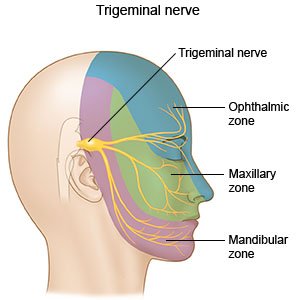Trigeminal Neuralgia
Medically reviewed by Drugs.com. Last updated on Dec 2, 2024.
Trigeminal neuralgia (TN) is a nerve disorder that causes sudden attacks of severe facial pain. You have a trigeminal nerve on each side of your face. The nerves allow you to feel pain, touch, and temperature changes in different areas of your face.
 |
DISCHARGE INSTRUCTIONS:
Call your local emergency number (911 in the US) if:
- You are feeling so depressed you want to harm yourself.
- You are confused and cannot think clearly.
- You have sudden dizziness, or problems with movement, weakness, or numbness in your face.
Seek care immediately if:
- You have a fever, stiff neck, or develop a rash or peeling skin.
- You are not eating or drinking, and you are losing weight.
- You have eye pain, eye numbness, or sudden vision or hearing changes.
Call your doctor or neurologist if:
- The medicines you are taking are not decreasing your TN pain.
- You feel worried or depressed and find it hard to do your daily activities.
- You have headaches, mouth sores, an upset stomach, or diarrhea.
- Your TN pain feels worse, different, or moves to another area of your face.
Medicines:
Do not stop taking your medicines without talking with your healthcare provider first. You can have a bad reaction if you stop your TN medicines suddenly. You may need any of the following:
- Anticonvulsants may help prevent pain attacks and decrease symptoms.
- Antidepressants may decrease pain and help prevent depression.
- Muscle relaxers may be used to help relax your facial muscles. This help lower the risk for pain attacks.
- Prescription pain medicine may be given. Ask your healthcare provider how to take this medicine safely. Some prescription pain medicines contain acetaminophen. Do not take other medicines that contain acetaminophen without talking to your healthcare provider. Too much acetaminophen may cause liver damage. Prescription pain medicine may cause constipation. Ask your healthcare provider how to prevent or treat constipation.
- Take your medicine as directed. Contact your healthcare provider if you think your medicine is not helping or if you have side effects. Tell your provider if you are allergic to any medicine. Keep a list of the medicines, vitamins, and herbs you take. Include the amounts, and when and why you take them. Bring the list or the pill bottles to follow-up visits. Carry your medicine list with you in case of an emergency.
Treatment options
The following list of medications are related to or used in the treatment of this condition.
Manage TN:
Even if you have not had symptoms for a long time, keep your medicines nearby. If your symptoms return, contact your healthcare provider before you start to take your medicines again.
Follow up with your doctor or neurologist as directed:
You may need to have blood tests to check your blood levels of certain medicines. Ask how often you need to return to have these blood tests. Write down your questions so you remember to ask them during your visits.
For more information:
- Trigeminal Neuralgia Association
2801 SW Archer Road
Gainesville , FL 32608
Phone: 1- 800 - 923-3608
Web Address: www.tna-support.org
© Copyright Merative 2024 Information is for End User's use only and may not be sold, redistributed or otherwise used for commercial purposes.
The above information is an educational aid only. It is not intended as medical advice for individual conditions or treatments. Talk to your doctor, nurse or pharmacist before following any medical regimen to see if it is safe and effective for you.
Learn more about Trigeminal Neuralgia
Treatment options
Care guides
Further information
Always consult your healthcare provider to ensure the information displayed on this page applies to your personal circumstances.
